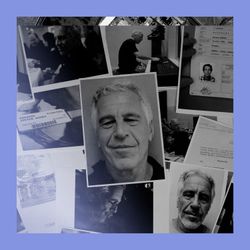Share

The Intelligence from The Economist
Minds blown: are we getting dumber?
•
Many adults perform worse in tests of literacy and numeracy than the average ten year old. And results have worsened in the past decade. Are our brains rotting? Russia’s economy could finally be nosediving (7:20). And remembering Eichmann’s jailer, Shalom Nagar (14:00).
Listen to what matters most, from global politics and business to science and technology—Subscribe to Economist Podcasts+
For more information about how to access Economist Podcasts+, please visit our FAQs page or watch our video explaining how to link your account.
More episodes
View all episodes

The splitting image: Yoon verdict will deepen divisions
25:47|Yoon Suk Yeol, South Korea’s ex-president, has been handed a life sentence for insurrection. That is by no means the end of the story of division in the country. Nervous AI-watchers fret about which workers might be replaced; our analysis suggests white-collar workers can breathe easy. And the memoir of Gisèle Pelicot, a rape survivor turned global symbol of strength.Guests and hosts:Noah Sneider, East Asia bureau chiefAlex Domash, economics correspondentAlexandra Suich Bass, Culture editorRosie Blau, co-host of “The Intelligence”Jason Palmer, co-host of “The Intelligence”Topics covered: South Korea, Yoon Suk YeolAI, white-collar jobsGisèle Pelicot, memoirGet a world of insights by subscribing to Economist Podcasts+. For more information about how to access Economist Podcasts+, please visit our FAQs page or watch our video explaining how to link your account.
The Robin Hood state: taxes are getting more progressive
22:12|Income inequality abounds and today’s rich are staggeringly rich, implying that tax regimes are giving the wealthy more and more of a pass. Our dig into the numbers suggests the opposite. We ask why so many of the world’s international mercenaries hail from Colombia. And despite the signs, Spanish may be reaching its peak in America.Guests and hosts:Callum Williams, senior economics writerCarla Subirana, news editorLane Greene, senior digital editorRosie Blau, co-host of “The Intelligence”Jason Palmer, co-host of “The Intelligence”Topics covered: Taxation, welfare state, inequalityColombia, international mercenariesSpanishGet a world of insights by subscribing to Economist Podcasts+. For more information about how to access Economist Podcasts+, please visit our FAQs page or watch our video explaining how to link your account.
Ice, ice, maybe: should the Arctic be refrozen?
22:03|Many scientists are considering the notion of actively cooling the region that is warming fastest. We examine the merits and the risks—both environmental and geopolitical—of messing with the polar climate. We ask why the kind of gig economy that has struggled in many markets is booming in India. And an unsettling peek into the first social network for AI agents.Guests and hosts:Oliver Morton, senior editorCatherine Brahic, environment editorKira Huju, Asia correspondentAlex Hern, AI writerRosie Blau, co-host of “The Intelligence”Jason Palmer, co-host of “The Intelligence”Topics covered: The Arctic, climate change, geoengineeringIndia, gig economyAgentic AI, social networking, MoltbookGet a world of insights by subscribing to Economist Podcasts+. For more information about how to access Economist Podcasts+, please visit our FAQs page or watch our video explaining how to link your account.
Check in the mail: our analysis of Epstein’s correspondence
25:33|Our data journalists trawled through the vast email archive of Jeffrey Epstein, a dead sex offender. It is a revealing look at how and with whom he communicated. As interest grows in banning young people’s use of social media, we argue there are better ways to mitigate harms. And a blindfolded introduction to “blouge”, a new, more climate-resilient wine variety.Guests and host:Rosie Blau, host of “The Intelligence”Dan Rosenheck, data editorTom Wainwright, media editorTom Standage, deputy editor of The EconomistTopics covered: The Epstein filesSocial-media bans“Blouge” wineGet a world of insights by subscribing to Economist Podcasts+. For more information about how to access Economist Podcasts+, please visit our FAQs page or watch our video explaining how to link your account.
Boss Class 6. The human defence
38:47|What's your unfair advantage over AI?In a future where computers can outperform humans at many tasks, where will people still have an edge?Andrew Palmer assesses the value of being human by visiting a chess tournament, writing the best management hip-hop song ever and facing his own clone for a final time.To listen to the full series, subscribe to Economist Podcasts+. https://subscribenow.economist.com/podcasts-plusIf you’re already a subscriber to The Economist, you have full access to all our shows as part of your subscription. For more information about how to access Economist Podcasts+, please visit our FAQs page or watch our video explaining how to link your account.To share this episode with a non-subscriber go to the episode page and click Share > 'Give as Gift'.
Boss Class 5. Closed problem spaces
32:56|Peering into the near future of AI:We can't know where AI will take us over the coming years. But it's certain that the technology will improve. In the penultimate episode, Andrew Palmer shares a vision of the near future, with the help of four people who are already living there.To listen to the full series, subscribe to Economist Podcasts+. https://subscribenow.economist.com/podcasts-plusIf you’re already a subscriber to The Economist, you have full access to all our shows as part of your subscription. For more information about how to access Economist Podcasts+, please visit our FAQs page or watch our video explaining how to link your account.To share this episode with a non-subscriber go to the episode page and click Share > 'Give as Gift'.
Stock options: how to hedge an AI bubble
22:24|Tech firms are spending so much on artificial intelligence that investors are getting nervous. Our correspondent explains whether it is possible to protect your portfolio from a crash. Turkey’s ruler has become increasingly autocratic–and increasingly old. Who might succeed him? And celebrating the life of literary agent Georges Borchardt. Guests and host:Rosie Blau, host of “The Intelligence”Josh Roberts, capital markets correspondentPiotr Zalewski, Turkey correspondentJon Fasman, senior culture correspondentTopics covered: Hedging against an AI bubbleTurkey after ErdoganObituary of literary agent Georges BorchardtListen to what matters most, from global politics and business to science and technology—Subscribe to Economist Podcasts+For more information about how to access Economist Podcasts+, please visit our FAQs page or watch our video explaining how to link your account.
Check in Kyiv: prospects for peace?
23:20|As Russia’s war in Ukraine nears four years, there has been no let up in the fighting on the battlefield. Yet there is some optimism that negotiations could yield a ceasefire. Our correspondent joins a Colombian drug raid to destroy a cocaine laboratory in the Amazon. And is crime in London really soaring? Guests and host:Rosie Blau, host of “The Intelligence”Oliver Carroll, Ukraine correspondentClaire McQue, Latin America writerSonny Loughran, Britain writerTopics covered: Ukraine peace prospectsColombia’s war on drugsCrime in LondonListen to what matters most, from global politics and business to science and technology—Subscribe to Economist Podcasts+For more information about how to access Economist Podcasts+, please visit our FAQs page or watch our video explaining how to link your account.
Dhaka matters: an election for Bangladesh
20:32|The toppling of authoritarian leader Sheikh Hassina in Bangladesh in 2024 was celebrated as a triumph for democracy. Tomorrow the country finally heads to the polls. Our correspondent weighs the choice. Can Mars and other bleak planets be made fit for human habitation? And why AI bots are applying for human jobs. To find out how to have sex in space, listen to this episode of “The Weekend Intelligence”. Guests and host:Rosie Blau and Jason Palmer, co-hosts of “The Intelligence”Mark Johnson, senior writerOliver Morton, senior editorShera Avi-Yonah, business writerTopics covered: Bangladesh’s electionAstrobiologyHow AI changes job recruitmentListen to what matters most, from global politics and business to science and technology—Subscribe to Economist Podcasts+For more information about how to access Economist Podcasts+, please visit our FAQs page or watch our video explaining how to link your account.